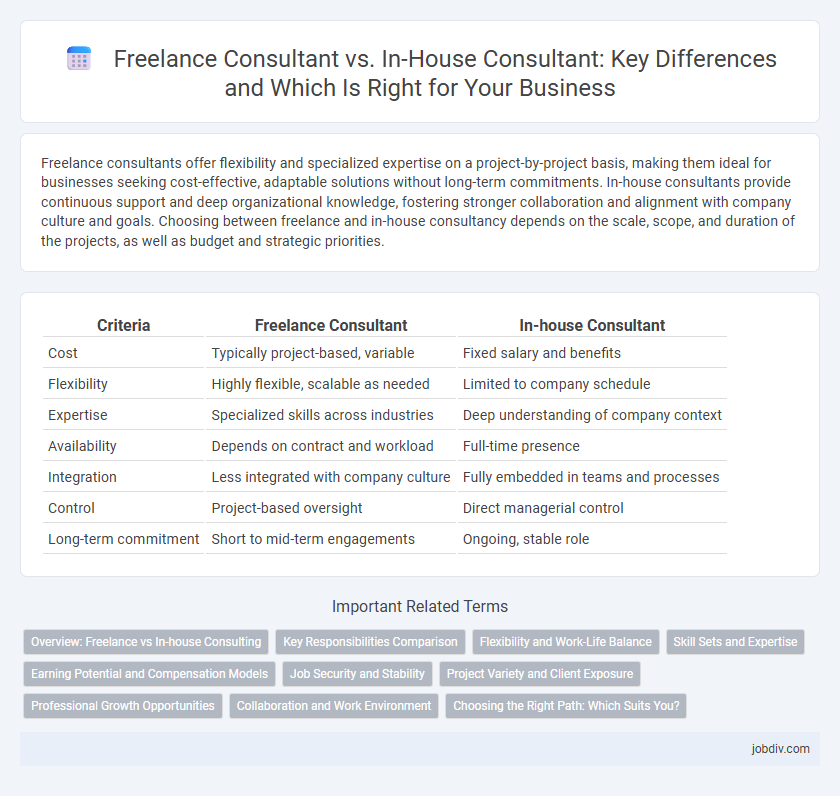Freelance consultants offer flexibility and specialized expertise on a project-by-project basis, making them ideal for businesses seeking cost-effective, adaptable solutions without long-term commitments. In-house consultants provide continuous support and deep organizational knowledge, fostering stronger collaboration and alignment with company culture and goals. Choosing between freelance and in-house consultancy depends on the scale, scope, and duration of the projects, as well as budget and strategic priorities.
Table of Comparison
| Criteria | Freelance Consultant | In-house Consultant |
|---|---|---|
| Cost | Typically project-based, variable | Fixed salary and benefits |
| Flexibility | Highly flexible, scalable as needed | Limited to company schedule |
| Expertise | Specialized skills across industries | Deep understanding of company context |
| Availability | Depends on contract and workload | Full-time presence |
| Integration | Less integrated with company culture | Fully embedded in teams and processes |
| Control | Project-based oversight | Direct managerial control |
| Long-term commitment | Short to mid-term engagements | Ongoing, stable role |
Overview: Freelance vs In-house Consulting
Freelance consultants offer specialized expertise on a flexible, project-by-project basis, often providing cost-effective solutions for short-term needs. In-house consultants deliver consistent, company-specific insights by deeply integrating with organizational culture and long-term goals. Choosing between freelance and in-house consulting depends on factors like budget, project duration, and the need for ongoing versus specialized support.
Key Responsibilities Comparison
Freelance consultants manage diverse projects across multiple clients, offering specialized expertise and flexible solutions tailored to specific business needs. In-house consultants focus on long-term organizational goals, collaborating closely with internal teams to implement strategies and drive continuous improvement. Both roles require strong analytical skills and problem-solving capabilities, but freelance consultants emphasize adaptability and client acquisition, while in-house consultants prioritize sustained internal support and company culture alignment.
Flexibility and Work-Life Balance
Freelance consultants offer superior flexibility by choosing projects and setting their own schedules, enabling better alignment with personal commitments and enhancing work-life balance. In-house consultants often face fixed hours and organizational constraints, which can limit adaptability but provide consistent income and benefits. Prioritizing flexibility, freelance roles support diverse work environments, while in-house positions deliver structured stability.
Skill Sets and Expertise
Freelance consultants bring diverse skill sets gained from multiple industries, offering specialized expertise tailored to specific projects and agile problem-solving abilities. In-house consultants possess deep organizational knowledge and ongoing insight into company culture, enabling strategic alignment and long-term project continuity. Both roles require strong analytical skills, but freelancers excel in adaptability across sectors while in-house consultants deliver sustained, integrated business solutions.
Earning Potential and Compensation Models
Freelance consultants typically command higher hourly rates compared to in-house consultants due to their specialized skills and project-based engagements, allowing for greater earning potential per assignment. Compensation models for freelancers are often variable, including fixed fees, hourly rates, or performance-based incentives, while in-house consultants usually receive a stable salary with benefits such as bonuses, health insurance, and retirement plans. Understanding these differences is crucial for organizations and professionals when evaluating the financial advantages and risks associated with each consultancy arrangement.
Job Security and Stability
Freelance consultants face fluctuating workloads and income variability, which can lead to less job security compared to in-house consultants who benefit from consistent salaries and employee benefits. In-house consultants enjoy company-supported professional development and structured career advancement, enhancing long-term stability. Freelancers must proactively manage business development and client acquisition to mitigate job insecurity inherent in project-based roles.
Project Variety and Client Exposure
Freelance consultants engage with diverse projects across multiple industries, enhancing their expertise and adaptability by working with various clients and business models. In-house consultants typically specialize in a single organization's projects, gaining deep insight into its specific challenges but limited exposure to different market sectors. The variety and breadth of client exposure available to freelancers often accelerate skill development and innovation compared to the focused experience of in-house consultants.
Professional Growth Opportunities
Freelance consultants often experience accelerated professional growth due to exposure to diverse projects and industries, enabling them to rapidly expand their skill sets and adapt to varying client needs. In-house consultants benefit from deeper organizational knowledge and long-term strategic involvement, providing opportunities for leadership development and expertise in company-specific processes. Both pathways offer unique advantages for professional advancement, with freelancing fostering breadth and adaptability, while in-house roles emphasize depth and stability.
Collaboration and Work Environment
Freelance consultants offer flexible collaboration tailored to specific project needs, often bringing diverse industry insights and adaptability to dynamic work environments. In-house consultants benefit from deeper integration within corporate culture, enabling seamless communication and long-term strategic alignment with internal teams. Both roles require effective collaboration skills, but the in-house consultant thrives on consistent environment familiarity, whereas freelancers excel in adjusting to varied organizational structures.
Choosing the Right Path: Which Suits You?
Freelance consultants offer flexibility and diverse project experience, ideal for professionals seeking autonomy and varied industry exposure, while in-house consultants provide deep organizational insight and stability through long-term strategic involvement. Selecting the right path depends on your preference for work-life balance, desire for steady income versus project-based earnings, and career goals related to specialization or adaptability. Evaluating your priorities in risk tolerance, networking opportunities, and professional development will guide the optimal choice between freelance and in-house consultancy roles.
Freelance Consultant vs In-house Consultant Infographic

 jobdiv.com
jobdiv.com